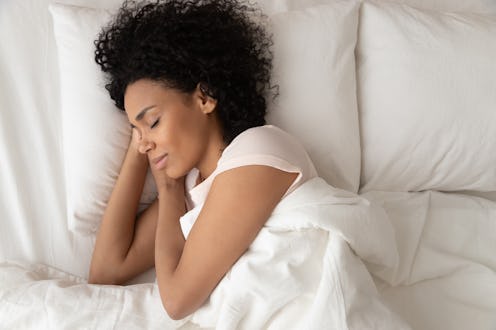Wellness
The Surprising Way Melatonin Affects Your Workout The Next Day
It can actually boost your sweat sesh.

Getting a good night's sleep can be harder to come by in the midst of pandemic stress and skyrocketing screen time. It's no wonder people have turned to sleep aids to catch some ZZZs — Nielsen data shows that melatonin supplement sales spiked by more than 40% in 2020. But could all that snoozing impact your waking activity? Here's what experts have to say about how melatonin affects your workout the next day.
Turns out melatonin can benefit your fitness routine in more ways than one. "Melatonin is a component of good overall sleep hygiene, and good sleep can improve physical performance the following day," says Dr. Brendon Ross, a sports medicine doctor at the University of Chicago. When you're snoozing, your body is repairing itself after engaging in strenuous exercise. "It’s important time to heal tissue, be that from an injury or microtraumas from your workout," he explains. "That can help you build new muscle, endurance, and exercise adaptations that will help you excel in your training."
Basically, getting good sleep is step one for a successful sweat sesh, according to Dr. John Ivy, an exercise physiologist at the University of Texas at Austin. Besides healing your muscles and improving your performance, studies show that quality sleep can improve your accuracy and reaction time — which means you'll be better at slaying exercises that require those skills, like agility drills and boxing. Sleep is really the basis for a successful day all around: Research says that getting seven to nine hours of rest can help your brain and body function at their best. And that translates to your performance in and out of the gym.
Choosing melatonin over any other sleep aids actually makes a difference in how your body feels the next day. Because it's a naturally occurring hormone, you likely won't experience any morning grogginess if you take the right dose at bedtime, says Ivy, which can leave you feeling more invigorated for your workout. Your brain naturally produces melatonin to help regulate sleep and your body's circadian rhythm, he explains — and that's not something many other sleep-boosting products can say. Sleep aids like NyQuil or Benadryl contain extra ingredients like nasal decongestants and can make you feel groggy the next day, says Ross.
Another way melatonin can affect your workout sesh? (Yes, there's more.) The supplement can support mental health, says Ross. Science backs it up: According to research, quality sleep can boost mental clarity, concentration, and productivity, all of which can help you push through your workout and feel good while doing it.
Also, the changes your body experiences from exercising don't happen during your sweat sesh — they happen when you're asleep. Essentially, when you work out, you’re priming your body to transform depending on your goals and activity of choice (like getting stronger biceps from weightlifting or improving your speed through sprinting drills). And melatonin helps make those changes happen. "You’re setting yourself up for [your body's] adaptations from training to occur during the recovery process, and the major time that recovery occurs is during sleep," says Ivy.
You're also getting stronger as you snooze because of your body's growth hormone. This naturally producing protein is what helps you grow when you're a kid, and it spikes after exercise to help your muscles recover. Melatonin can actually boost growth hormone levels while you sleep to help you bounce back from all those at-home workouts and get stronger, says Ivy.
If you're looking to try melatonin for yourself, Ross recommends starting "low and slow" with a 1 to 3 milligram supplement, and upping your dose to 5 or 10 milligrams if needed. That said, he advises to also practice good sleep hygiene for quality ZZZs and not to rely solely on melatonin. "Avoid screen time before bed and keep work-related materials out of the bedroom," Ross tells Bustle. "That is critical for mental and physical performance."
Studies referenced:
Auld, F. (2017). Evidence for the efficacy of melatonin in the treatment of primary adult sleep disorders. Sleep Medicine Reviews. https://pubmed.ncbi.nlm.nih.gov/28648359/
Ellenbogen, J. (2005). Cognitive benefits of sleep and their loss due to sleep deprivation. Neurology. https://pubmed.ncbi.nlm.nih.gov/15824327/
Watson, A. (2017). Sleep and Athletic Performance. Current Sports Medicine Reports. https://journals.lww.com/acsm-csmr/fulltext/2017/11000/sleep_and_athletic_performance.11.aspx
Worley, S. (2018). The Extraordinary Importance of Sleep. Pharmacy and Therapeutics. https://www.ncbi.nlm.nih.gov/pmc/articles/PMC6281147/
Experts:
Dr. John Ivy, P.h.D, an exercise physiologist at the University of Texas at Austin
Dr. Brendon Ross, D.O., M.S., a sports medicine doctor at University of Chicago
This article was originally published on